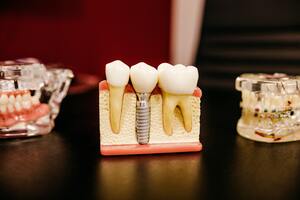What Are Dental Implants?
In a nutshell, dental implants are permanent replacements for missing teeth. The form they take depends mainly on the number of missing teeth, the strength of the jaw, and the patient’s overall health. At BC Perio, we want to help you understand your options for a healthy mouth and a beautiful smile, including improvements that a variety of dental implants can provide.
What Are the Types of Implants



There are primarily three types of dental implants: Endosteal, MDIs, and Subperiosteal. The most common form of implant is the Endosteal. Your dentist will insert a post into your jaw. After it heals, a replacement tooth screws onto the post, creating a permanent tooth. But this requires a healthy jawbone. MDIs or Mini Dental Implants may be an option for those lacking enough bone. These use tiny posts, about the width of a toothpick, inserted into the bone. Finally, Subperiosteal implants may be an option for those with extensive jawbone damage. For this procedure, the dentist places a metal framework over the jawbone but under the gum to serve as the foundation for implants.
How Are Dental Implants Used?
Dental implants will replace a missing tooth and stabilize an entire upper or lower denture plate or anything in between. For a single tooth, endosteal implants are most often a great solution. To replace two or three teeth, your dentist may encourage two implants with a dental bridge spanning the gap. Two or four posts are implanted into the jaw to offer stability to complete dentures. After healing, caps are placed on top instead of teeth. These caps correspond to holes in the base of the dentures. Patients simply snap the dentures in and out of their mouths. This makes cleaning and good oral care easy.
How Long Does it Take to Heal?
Healing time is entirely dependent on how much dental restoration you need. The least amount of time is usually four to six weeks. It takes more than a month for the bone to heal around the implanted post. Your dentist will take an X-ray to ensure the bone heals before placing the permanent tooth on the post. On the other hand, a Subperiosteal implant may take a little longer because the soft tissue and bone must heal before any additional work can be performed. The final factor is the overall health of the patient. People with diabetes or other health issues may heal slower than those at the peak of health.
Are There Risks?
As with any oral surgery, there are potential risks to know. Patients must always be on the lookout for infection and practice the best oral hygiene possible before the procedure and during the healing process. Report any redness, swelling, or problems to your dentist immediately. In addition, there is a slight risk that the bone won’t heal around the implant. Should this occur, your dentist can replace the Endosteal with a Subperiosteal implant.
Dental implants are often considered to be an excellent solution to replace missing or failing teeth. Give BC Perio a call to explore your options and give yourself a healthy mouth.